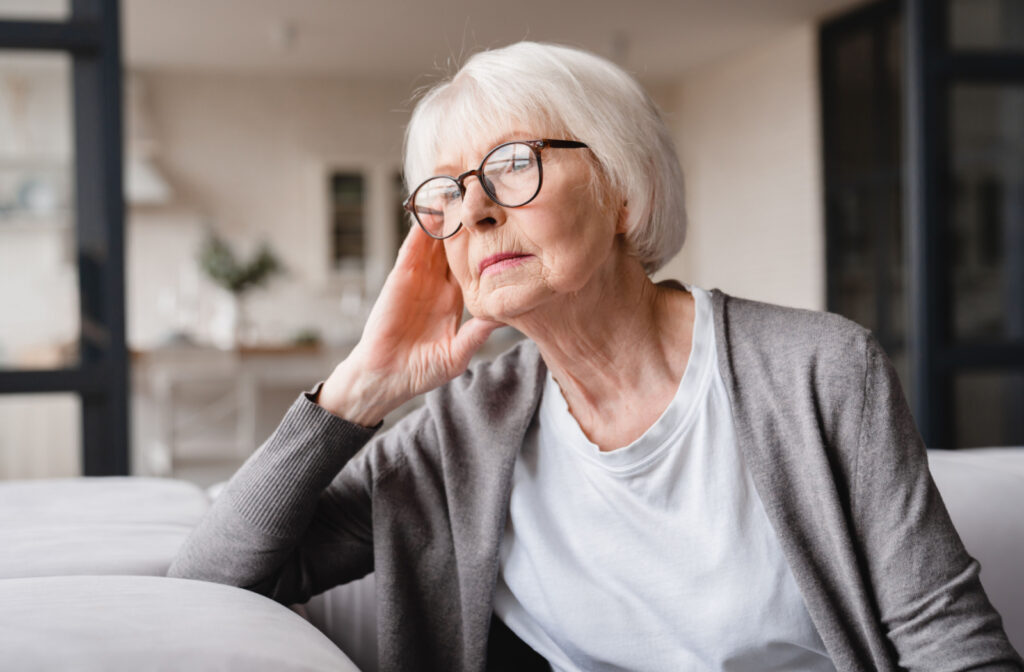The notion of independence among people with dementia is a topic teeming with complexities and concerns. As the awareness of dementia continues to rise, so too does the conversation around whether those affected can sustain an independent lifestyle within the comforts of their own homes.
Some people with dementia may be able to live alone as long as they have a proper support system in place, while others may benefit more from memory care.
Dementia is an umbrella term for conditions that cause a set of symptoms associated with a decline in memory, reasoning, and other thinking skills. This decline can be severe enough to impair a person’s ability to perform everyday activities, making living alone more challenging.
Living Alone with Dementia
The capability of an individual with dementia to live unassisted can depend on several variables. Early diagnosis can be a significant factor, as it can create an opportunity to establish strong support systems.
Additionally, the stage of dementia plays a crucial role. Those in the early stages may manage to live alone quite successfully with appropriate interventions. However, as the disease progresses, people can experience increased difficulty in performing daily tasks and may require more assistance.
It is essential to assess cognitive abilities and functional limitations when considering living alone with dementia. This includes evaluating memory, decision-making skills, and the ability to complete everyday activities such as cooking, cleaning, and managing medication. It is also crucial to consider any safety risks that may arise due to impaired judgment or forgetfulness.
For those who are able to live alone with dementia, there are several factors to consider for creating a safe and comfortable living space, such as ensuring living areas are clutter-free with clear paths for movement.
Challenges of Living Alone with Dementia
Living alone with dementia can present several obstacles. Cognitive decline may impair judgment, making tasks like managing finances or taking medication correctly burdensome.
Safety issues can also escalate, so it’s important to have a reliable emergency response system in place in case of an accident or medical emergency—and to provide supervision for potentially hazardous activities.
An increased risk of falls, kitchen accidents, wandering, and mental health effects from isolation are also important challenges to consider.
Supportive Strategies for Independent Living
Certain strategies could bolster the potential for independent living with dementia, including the following home modifications and habits:
- Removing rugs to prevent trips and falls
- Installing grab bars
- Installing ramps
- Setting up automated lighting
- Wearing GPS devices to address wandering
- Installing remote monitoring cameras
- Using medication reminders
- Installing emergency response systems
- Maintaining regular check-ins with family members, friends, or neighbors
- Joining community groups or participating in social activities
- Creating a clear emergency plan
- Making sure that important documents and information are easily accessible
Furthermore, proper planning and communication are essential when it comes to independent living. It’s important to communicate openly with healthcare providers, caregivers, and loved ones about any concerns or limitations to ensure everyone is on the same page.
In many cases, when extensive home modifications and lifestyle adjustments are being considered, it’s also worth thinking about memory care communities, where safe, secure living spaces and support for blissful living can be fully provided, allowing people with dementia and their families to focus on living well.
Legal & Ethical Considerations
The legal framework surrounding living independently with dementia involves evaluating an individual’s capacity to make decisions. Should cognitive decline reach a point where decision-making is notably impaired, advanced directives and guardianship laws may come into play. These legal instruments help make sure that a person’s interests and autonomy are respected, even when they’re no longer able to advocate for themselves.
Community Support Is Key
Living independently with dementia is not just about physical modifications or technological advancements—it also requires strong community support. Organizations such as local Alzheimer’s associations can offer resources, education, and support groups for both individuals with dementia and their family caregivers.
These groups can provide a sense of community and understanding for those facing similar challenges, as well as valuable information on how to navigate the complex aspects of living independently with dementia.
Social Connections
In addition to support groups, having social connections can also be crucial for individuals with dementia. This could include participating in hobbies or activities they enjoy, joining senior centers or clubs, or simply spending time with friends and family.
Social interactions not only help improve overall well-being but also help combat feelings of isolation and loneliness that may arise from living alone.
Varying Levels of Independence
It’s important to note that the level of independence someone with dementia can maintain may vary based on individual abilities and the progression of the disease. However, by using physical modifications, assistive technologies, and community support systems, some people with dementia may be able to continue to live independently during the condition’s early stages.
Assistive Technologies
In addition to physical modifications and assistive technologies, community support systems can play a crucial role in helping people with dementia live independently. These may include meal delivery services, transportation assistance, or home care services that provide additional support with daily tasks.
Healthy & Active Lifestyles
It’s important for people with dementia to maintain a healthy and active lifestyle. Regular exercise, a balanced diet, and engaging in mentally stimulating activities can help improve overall well-being and slow the progression of symptoms.
Family Caregiver Support
Family caregivers also play an integral role in supporting those with dementia. They should seek out resources and support groups to learn about effective communication techniques, coping strategies, and self-care practices.
Building a strong support network is essential for the well-being of both people with dementia and their caregivers.
Determining If It Is Time for a Senior Living Community
It’s important to recognize that every person with dementia experiences the condition differently. Therefore, it’s crucial to create personalized plans that cater to your specific needs. This may involve working closely with healthcare professionals, family members, and other care providers to develop a comprehensive care plan.
Feel free to reach out to us at Meadowcrest at Middletown for guidance. We can help ease the transition between living at home and enjoying life with the support offered by memory care. Book a visit today to learn more about our community in person.





